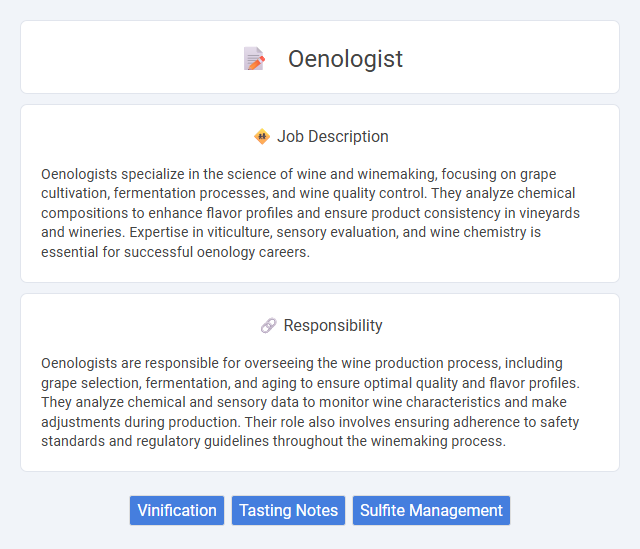
Oenologists specialize in the science of wine and winemaking, focusing on grape cultivation, fermentation processes, and wine quality control. They analyze chemical compositions to enhance flavor profiles and ensure product consistency in vineyards and wineries. Expertise in viticulture, sensory evaluation, and wine chemistry is essential for successful oenology careers.
Individuals with strong sensory skills, patience, and a passion for wine tasting are likely to thrive as oenologists. Those who enjoy detailed scientific work combined with creativity in wine production may find this profession particularly suitable. People who prefer dynamic, social environments might find the oenologist role less fitting, as it often involves solitary or lab-focused tasks.
Qualification
An oenologist typically holds a degree in viticulture, enology, or wine science, demonstrating expertise in the biochemical processes of winemaking and grape cultivation. Professional certifications from recognized institutions, such as the Institute of Masters of Wine or the American Society for Enology and Viticulture, enhance credibility and career prospects. Strong analytical skills and experience in sensory evaluation are essential for assessing wine quality and guiding production techniques.
Responsibility
Oenologists are responsible for overseeing the wine production process, including grape selection, fermentation, and aging to ensure optimal quality and flavor profiles. They analyze chemical and sensory data to monitor wine characteristics and make adjustments during production. Their role also involves ensuring adherence to safety standards and regulatory guidelines throughout the winemaking process.
Benefit
An oenologist's expertise in wine fermentation and quality control likely improves the consistency and flavor profile of wine, increasing market appeal. Their role in monitoring vineyard conditions could enhance grape quality, potentially boosting overall production value. Employing advanced sensory analysis techniques may lead to innovative wine blends, offering competitive advantages in the wine industry.
Challenge
Oenologists likely face the challenge of balancing scientific precision with the art of winemaking, ensuring grape quality and fermentation processes meet high standards. They probably encounter variable environmental factors that affect grape characteristics, requiring constant adaptation and problem-solving. Managing these complexities while maintaining consistent wine flavor profiles could be a significant and ongoing challenge in their role.
Career Advancement
Oenologists specializing in wine production can advance their careers by gaining expertise in vineyard management, sensory analysis, and fermentation technology, which are essential for senior winemaking roles. Progression often includes moving from laboratory technician positions to head winemaker or vineyard manager roles, with opportunities to oversee entire production processes and influence wine quality. Continuing education, certifications such as WSET diplomas, and experience in international wine markets significantly enhance career growth and leadership prospects in the oenology field.
Key Terms
Vinification
Oenologists specialize in vinification, overseeing the fermentation process that transforms grape juice into wine by controlling yeast activity, temperature, and sugar levels to achieve desired flavor profiles. Their expertise in chemical analysis and sensory evaluation ensures quality and consistency in wine production. Oenologists play a critical role in optimizing fermentation techniques to enhance aroma, taste, and texture, directly impacting the final product's marketability.
Tasting Notes
Oenologists specialize in analyzing wine characteristics, meticulously evaluating tasting notes such as aroma, flavor profile, acidity, tannin structure, and mouthfeel to determine wine quality and potential aging capacity. Their expertise includes identifying subtle nuances between grape varieties, fermentation techniques, and terroir influences, which guides blending decisions and quality control. Precision in tasting note documentation supports wineries in enhancing product consistency and market positioning.
Sulfite Management
Oenologists specializing in sulfite management play a crucial role in controlling sulfur dioxide levels during wine production to preserve quality and prevent oxidation. They monitor and adjust sulfite concentrations at various stages, ensuring compliance with regulatory standards and minimizing health risks for consumers. Advanced techniques used by oenologists include real-time sulfite testing and tailored antioxidant treatments to balance preservation and sensory attributes.
 kuljobs.com
kuljobs.com